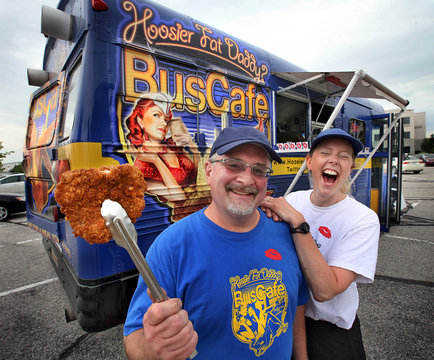INDIANAPOLIS, IN – Pots rattle with boiling rice. Onion, sliced like confetti, pops in the wok, as the chef drizzles rosewater into a large bowl of flour and eggs. Then, cardamom pods are crushed to prepare for a week’s worth of South Indian cuisine.
Is this a peek at the newest ethnic restaurant in town? Not quite . . . at least, not in the brick-and-mortar sense. The menu under way is for one in a fleet of new food options — fresh from a truck.
Once largely a bicoastal trend, tricked-out food trucks are rolling into Indy, steering stepped-up street food and gourmet-fusion fare onto our plates. And unlike the greasy grub of yesterday, today’s mobile meals lean toward locally grown, slow-cooked and organic fare.
“I have a lot of faith in our Midwest palates,” said Becky Hostetter, the chef behind the Duos food truck, while prepping her South Indian menu recently. “Our new customers are growing.”
Customers also are lining up at Mabel on the Move, the creation of local mom Kate McKibben to serve healthy comfort food; and Tom Rockwell’s Hoosier Fat Daddy BusCafe, featuring slow-cooked American favorites.
Many food truck chefs prepare their meals in commercial kitchens. Food is either stored overnight for next-day service or loaded onto vehicles that day. Lunchtime locations can vary daily — from parking lots to sidewalks — and are advertised on Twitter, Facebook and the food trucks’ websites.
The fact that high-quality food trucks have arrived in Indianapolis doesn’t surprise Tim Zagat, co-founder of the Zagat Survey, the iconic guide that has driven restaurant trends around the world based on consumer reviews.
“I think food trucks are a very important phenomenon all over the country,” said Zagat, days after organizing a sold-out food truck festival in Manhattan. “They are increasingly able to produce fine food.”
But what’s driving this phenomenon?
Zagat cited growing diversity and the economy. Lower operating costs for mobile restaurants, coupled with rising expectations about our food, make it good business.
And with more trucks trolling sidewalks, local food and wine experts are taking note.
Meredith Easley of Easley Winery welcomes the food truck boom and said she is making plans to court the roving restaurants for “Taste of Downtown,” the annual August festival at her family’s winery on North College Avenue.
“The idea is not familiar in the Midwest . . . good, quality food, from food trucks,” she said during a recent event with the Hoosier Fat Daddy BusCafe at the winery. “It’s changing the culture.”
Unlike the cutthroat food truck wars in California, or the crowded festivals in New York, many of the food truck chefs here say they want to create a sense of community around healthier food. They want to know their customers and make quality food accessible and affordable. Most items range from $3 to $7.
Duos’ Hostetter, who ran a vegetarian restaurant more than a decade ago, said the response to her menu, often an eclectic mix of hormone-free beef or vegetarian dishes, has been inspiring.
“I just feel like there is openness and a willingness to try something different,” she said. “I want to bring food that engages people, our community, our neighborhoods.”
Recently at Indy’s Kitchen, the commercial space Duos rents to prepare food, Hostetter, her business partner, John Garnier, and cook, Anthony Perry, synchronized their movements to their tasks: Garnier chopped onions, Perry peeled potatoes, and Hostetter looked over the recipe for rosewater cardamom cake.
The next day, T.J. Osborne dodged light rain to grab a Duos lunch at Wishard Hospital’s farmers market, a weekly event promoting healthy choices.
“We could walk across the street and eat at any of the (fast-food) chains, but with this,” she said, cradling her hyderbadi chicken,” I don’t feel guilty. I love it.”
Several blocks away, Mabel on the Move catered to a business crowd on North Meridian Street.
In front of his co-workers, 28-year-old Tim Carter pumped his shoulders up and down in anticipation of Mabel’s homemade mac and cheese topped with panko.
“I’m trying to eat healthy,” he said. “I don’t like ingredients that you can’t pronounce.”
And that, says McKibben, is the point.
“My whole mission is to bring healthy food to the people. This is something I can do: I can bring them a good, quality meal, a little taste of Mom’s cooking.”
McKibben, 53, whose youngest child left home last year, said she couldn’t sit idle in an empty nest. An Airstream enthusiast and avid cook, she was flipping through a magazine looking for her next adventure when she spotted a 1962 Airstream Globetrotter Travel Trailer. She had an idea.
In March, McKibben rolled out her “twist on comfort food” — no high-fructose corn syrup, humanely treated beef and mostly organic ingredients.
Find the entire article <here>




